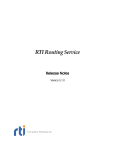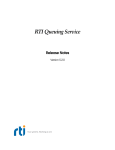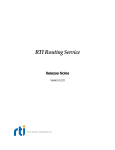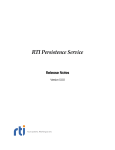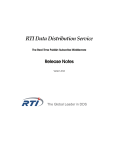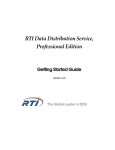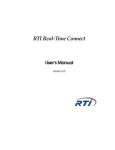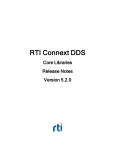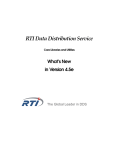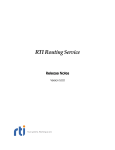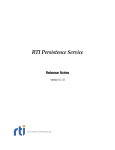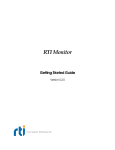Download RTI Secure WAN Transport - Community RTI Connext Users
Transcript
RTI Secure WAN Transport Core Libraries and Utilities Release Notes Version 5.1.0 © 2013 Real-Time Innovations, Inc. All rights reserved. Printed in U.S.A. First printing. December 2013. Trademarks Real-Time Innovations, RTI, and Connext are trademarks or registered trademarks of Real-Time Innovations, Inc. All other trademarks used in this document are the property of their respective owners. Copy and Use Restrictions No part of this publication may be reproduced, stored in a retrieval system, or transmitted in any form (including electronic, mechanical, photocopy, and facsimile) without the prior written permission of RealTime Innovations, Inc. The software described in this document is furnished under and subject to the RTI software license agreement. The software may be used or copied only under the terms of the license agreement. Technical Support Real-Time Innovations, Inc. 232 E. Java Drive Sunnyvale, CA 94089 Phone: (408) 990-7444 Email: [email protected] Website: https://support.rti.com/ Release Notes 1 Supported Platforms This release of RTI® Secure WAN Transport is supported on the architectures listed in Table 1.1. Table 1.1 Supported Platforms Operating System Windows Solaris QNX Linux Red Hat® Enterprise Linux® 5.0 (2.6 kernel) Ubuntu® Server 12.04 LTS CPU x86 x64 x86 x64 Compiler gcc 4.1.1 RTI Architecture Abbreviation i86Linux2.6gcc4.1.1 Java Platform, Standard Edition JDK 1.7 i86Linux2.6gcc4.1.1jdk gcc 4.1.1 x64Linux2.6gcc4.1.1 Java Platform, Standard Edition JDK 1.7 x64Linux2.6gcc4.1.1jdk gcc 4.6.3 i86Linux3.xgcc4.6.3 Java Platform, Standard Edition JDK 1.7 i86Linux3.xgcc4.6.3jdk gcc 4.6.3 x64Linux3.xgcc4.6.3 Java Platform, Standard Edition JDK 1.7 x64Linux3.xgcc4.6.3jdk Wind River® Linux 4 (2.6 kernel) x64 gcc 4.4.1 x64WRLinux2.6gcc4.4.1 QNX® Neutrino® 6.5 x86 qcc 4.4.2 with GNU C++ libraries i86QNX6.5qcc_gpp4.4.2 Solaris™ 2.10 gcc3.4.2 sparcSol2.10gcc3.4.2 Ultra SPARC® Java Platform, Standard Edition JDK 1.7 sparcSol2.10jdk Windows® 2003 Visual Studio 2005 SP 1 i86Win32VS2005 Windows Vista® (32-bit x86 Edition) Visual Studio 2005 SP 1 (C++/CLI, C# 8.0 or 9.0) i86Win32dotnet2.0 Windows XP Professional Java Platform, Standard Edition JDK 1.7 i86Win32jdk Table 1.2 lists an additional target library for which RTI offers custom support. If you are interested in using this platform, please contact your local RTI representative or email [email protected]. Table 1.2 Custom Supported Platforms Operating System CPU Compiler NI Linux Real-Time 3.2 ARM Cortex-A9 gcc 4.4.1 RTI Architecture Abbreviation armv7AngstromLinux3.2gcc4.4.1.cortex-a9 1 Compatibility 2 Compatibility RTI Secure WAN Transport is an optional product for use with RTI Connext™ (formerly, RTI Data Distribution Service) with the same version number. 3 What’s New in 5.1.0 3.1 New Platforms This release adds support for the following platforms: ❏ QNX Neutrino 6.5.0 SP1 ❏ Ubuntu Server 12.04 LTS ❏ Wind River Linux 4 (2.6 kernel) 3.2 New Default Transport Settings Some of the default settings for a number of the provided transport plugins have changed to provide better out-of-the-box performance. By increasing the out-of-the-box performance, in most cases you will not have to modify these settings or keep them in sync across all Connext applications and services within your system. The default values for message_size_max, send_socket_buffer_size, recv_socket_buffer_size have changed. Table 3.1 shows the old and new default values. Table 3.1 and WAN Transport Changes Old Default (bytes) New Default (bytes) Non-INTEGRITY Platforms INTEGRITY Platforms1 message_size_max 9216 655072 9216 send_socket_buffer_size 9216 131072 131072 recv_socket_buffer_size 9216 131072 131072 1. Due to limits imposed by the INTEGRITY platform, the new default settings for all INTEGRITY platforms are treated differently than other platforms. Please see the RTI Core Libraries and Utilities Platform Notes for more information on the issues with increasing the message_size_max default values on INTEGRITY platforms. Notice that interoperation with INTEGRITY platforms will require updating the transport property message_size_max so that it is consistent across all platforms. 2. The value 65507 represents the maximum user payload size that can be sent as part of a UDP packet. 4 Compatibility In Connext 5.1.0, the default value for message_size_max for this transport has changed. Secure WAN Transport also uses this value. Consequently, Secure WAN Transport 5.1.0 is not off-the-shelf compatible with applications running older versions of this transport. See the Core Libraries and Utilities Release Notes for instructions on how to resolve the compatibility issue with older Connext and RTI Data Distribution Service applications. 2 What’s Fixed in 5.1.0 5 What’s Fixed in 5.1.0 5.1 Error "dtls message too big" when Sending Data over DTLS When sending data over the DTLS transport, you may have seen the following error message: NDDS_Transport_DTLS_Connection_send:OpenSSL error: [1410c13e]:[DTLS1_WRITE_APP_DATA_BYTES]:[dtls message too big] This message happens because the OpenSSL DTLS maximum message size is 16384 bytes. This issue has been resolved by enforcing that the DTLS transport property parent.message_size_max must be no more than 16384 bytes, therefore preventing the error from ever happening. [RTI Issue ID COREPLG-39] 5.2 Unable to Set DTLS send_socket_buffer_size to Less than Default When using the DTLS transport, setting the DTLS send_socket_buffer_size to a value less than the default of 9216 would result in the following errors and create_participant() would fail: [D0000|ENABLE]NDDS_Transport_UDPv4_Property_verify:send_socket_buffer_size < message_size_max [D0000|ENABLE]NDDS_Transport_UDPv4_newI:Invalid transport properties. [D0000|ENABLE]NDDS_Transport_DTLS_newI:!Failed to allocate base UDPv4 transport [D0000|ENABLE]DDS_DomainParticipantConfigurator_setup_custom_transports:!cr eate custom transport plugin [D0000|ENABLE]DDS_DomainParticipantConfigurator_enable:!install transport plugin aliases = custom transports [D0000|ENABLE]DDS_DomainParticipant_enableI:!enable transport configurator DDSDomainParticipant_impl::createI:ERROR: Failed to auto-enable entity DomainParticipantFactory_impl::create_participant():!create failure creating participant These errors would occur even if you set the DTLS message_size_max to be less than or equal to the value of the DTLS send_socket_buffer_size. This issue has been resolved. [RTI Issue ID COREPLG-171] 5.3 Memory Leak in DTLS Transport A graceful shutdown of a DomainParticipant that was using the DTLS transport and had communicated with other DomainParticipants over DTLS may not have properly freed all DTLS transport resources, resulting in a memory leak. This issue has been resolved. [RTI Issue ID COREPLG-172] 5.4 Failed to Reopen Closed Connections in Asymmetric TCP When a large number of clients connected to an asymmetric TCP server, some connections were closed and never reopened, preventing the discovery of DDS entities and/or the delivery of user data. This problem has been resolved. [RTI Issue ID COREPLG-178] 3 Available Documentation 6 Available Documentation The following documentation is provided with the Connext distribution. (The paths show where the files are located after Connext has been installed in <NDDSHOME>.) ❏ RTI Secure WAN Transport Installation Guide (<NDDSHOME>/doc/pdf/RTI_Secure_WAN_InstallationGuide.pdf, also available for download from RTI’s Customer Portal.) ❏ RTI Core Libraries and Utilities User’s Manual RTI_CoreLibrariesAndUtilities_UsersManual.pdf) (<NDDSHOME>/doc/pdf/ ❏ RTI Secure WAN Transport API Reference HTML documentation: Open <NDDSHOME>/ReadMe.html, then select Secure WAN Transport. ❏ Example code: <NDDSHOME>/example/<language>/helloWorldWAN. 7 Known Issues ❏ When communicating over some networks, the WAN and Secure Transport plug-ins may fail to send data larger than the MTU (maximum transmission unit) size available for the network. This is especially likely over wide-area networks. This scenario is also a suggested configuration of the DTLS protocol, according to the DTLS specification, which is IETF RFC 4347. If problems occur while sending large packets, set the maximum_message_size transport property to the MTU of your network minus 28 bytes for the DTLS header and set up your application according to the Large Data Use Cases “How To” provided in the online (HTML) documentation. For example, for an MTU size of 1500 bytes (for standard Ethernet), set maximum_message_size to 1500 - 28 = 1472. One instance of this problem for which there is no workaround is the case where the discovery packets are larger than your network’s MTU. This could occur if user data, propagated properties, or type-codes are configured. ❏ An application using the WAN transport may appear to hang for several minutes if the WAN server is shut down and not restarted before the application tries to contact it, or if the application is unable to communicate with the WAN server. Two scenarios under which the application tries to contact the STUN server are during shut down and while establishing a connection with the initial peers. This issue is due to a sequence of synchronous STUN transactions with the STUN server. If you need to run WAN transport without a STUN server, here are some recommendations: • Decrease the blocking time by decreasing the number of STUN retransmissions. To do so, change the property, stun_number_of_retransmissions. For example, a change from the default of 7 retries to 5 retries will result in a total period of 3.1 seconds per synchronous operation. Note however, that this may impact the ability to reliably set up connections to peers over a WAN. • Decrease the blocking time by using a participant ID limit of zero when configuring the initial peer descriptors. 4 Third-Party Licenses For example, when the peer descriptor wan://::1:10.10.1.150 is specified, DDS will try to contact five participants with the same WAN ID in different ports. Usually there is only one participant using the same WAN ID. Although the other four participants will never be reachable, the application still tries to establish communication with them by contacting the STUN server. You can reduce the number of participants to which the application will try to contact to one by using a participant ID limit of zero in the peer descriptor. For example, 0@wan://::1:10.10.1.150. For additional information on peer descriptors see the Discovery chapter in the RTI Core Libraries and Utilities User’s Manual. 8 Third-Party Licenses This product includes software developed by the OpenSSL Project for use in the OpenSSL Toolkit (http:// www.openssl.org/). Copyright (c) 1998-2011 The OpenSSL Project. All rights reserved. The OpenSSL toolkit stays under a dual license, i.e. both the conditions of the OpenSSL License and the original SSLeay license apply to the toolkit. See below for the actual license texts. Actually both licenses are BSD-style Open Source licenses. In case of any license issues related to OpenSSL please contact [email protected]. Redistribution and use in source and binary forms, with or without modification, are permitted provided that the following conditions are met: 1. Redistributions of source code must retain the above copyright notice, this list of conditions and the following disclaimer. 2. Redistributions in binary form must reproduce the above copyright notice, this list of conditions and the following disclaimer in the documentation and/or other materials provided with the distribution. 3. All advertising materials mentioning features or use of this software must display the following acknowledgment: This product includes software developed by the OpenSSL Project for use in the OpenSSL Toolkit. (http://www.openssl.org/) 4. The names "OpenSSL Toolkit" and "OpenSSL Project" must not be used to endorse or promote products derived from this software without prior written permission. For written permission, please contact [email protected]. 5. Products derived from this software may not be called "OpenSSL" nor may "OpenSSL" appear in their names without prior written permission of the OpenSSL Project. 6. Redistributions of any form whatsoever must retain the following acknowledgment: This product includes software developed by the OpenSSL Project for use in the OpenSSL Toolkit (http://www.openssl.org/) THIS SOFTWARE IS PROVIDED BY THE OpenSSL PROJECT ``AS IS'' AND ANY EXPRESSED OR IMPLIED WARRANTIES, INCLUDING, BUT NOT LIMITED TO, THE IMPLIED WARRANTIES OF MERCHANTABILITY AND FITNESS FOR A PARTICULAR PURPOSE ARE DISCLAIMED. IN NO EVENT SHALL THE OpenSSL PROJECT OR ITS CONTRIBUTORS BE LIABLE FOR ANY DIRECT, INDIRECT, INCIDENTAL, SPECIAL, EXEMPLARY, OR CONSEQUENTIAL DAMAGES (INCLUDING, BUT NOT LIMITED TO, PROCUREMENT OF SUBSTITUTE GOODS OR SERVICES; LOSS OF USE, DATA, OR PROFITS; OR BUSINESS INTERRUPTION) HOWEVER CAUSED AND ON ANY THEORY OF LIABILITY, WHETHER IN CONTRACT, STRICT LIABILITY, OR TORT (INCLUDING NEGLIGENCE OR OTHERWISE) ARISING IN ANY WAY OUT OF THE USE OF THIS SOFTWARE, EVEN IF ADVISED OF THE POSSIBILITY OF SUCH DAMAGE. This product includes cryptographic software written by Eric Young ([email protected]). includes software written by Tim Hudson ([email protected]). This product 5







